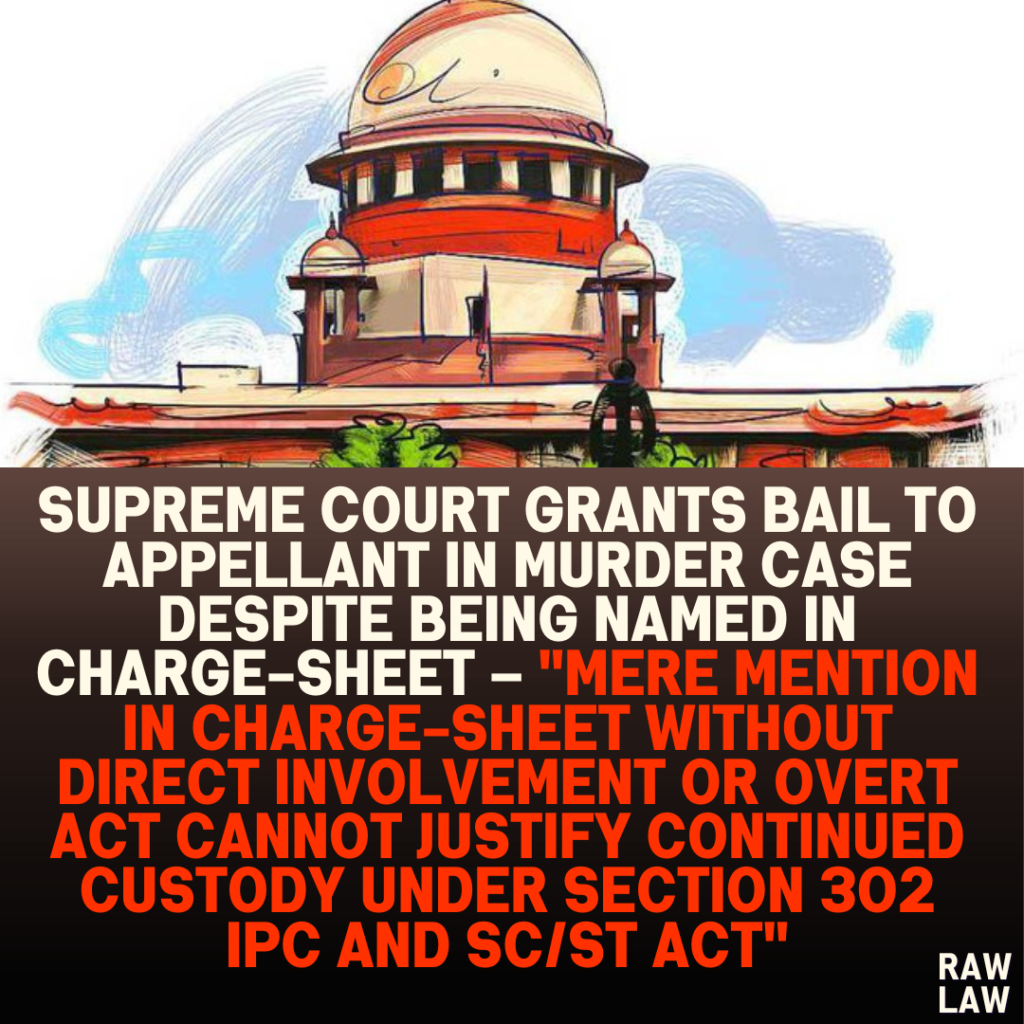Court’s Decision
The Supreme Court allowed the appellant’s bail plea, setting aside the High Court’s order which had denied the same. The Court highlighted that the appellant was not named in the initial FIR and no overt act was directly attributed to him. The fact that the charge-sheet was filed and he was subsequently named was not considered sufficient to justify his continued incarceration. The Court directed the trial court to release the appellant on bail with appropriate conditions to ensure his presence during trial proceedings.
Facts
The appellant was facing trial under Section 302 read with Section 34 of the Indian Penal Code, 1860, and Sections 3(2), (5), and (6) of the Scheduled Castes and the Scheduled Tribes (Prevention of Atrocities) Act, 1989, for his alleged involvement in a murder case. The crime was registered following an FIR lodged on 01.08.2023 at Powai Police Station, District Brahan Mumbai City. The main accused, named in the FIR, was stated to have used a knife against the deceased. The appellant, however, was not named in the initial complaint and was arrested later.
The appellant’s plea for bail was rejected by the High Court of Bombay on 25.06.2024, leading to the present appeal before the Supreme Court. During the pendency of the appeal, the appellant had been in custody for over a year and two months.
Issues
- Whether the appellant’s continued detention was justified when no direct involvement or overt act was attributed to him in the FIR.
- Whether the mere mention of the appellant’s name in the charge-sheet, filed after the investigation, was sufficient to deny him bail.
Petitioner’s Arguments
The appellant argued that:
- He was not named in the initial FIR and no specific role was attributed to him.
- The weapon used (a knife) was reportedly wielded by another accused named in the FIR.
- He has been in custody since 01.08.2023, and the charge-sheet was filed on 31.10.2023.
- He is only 23 years old, and his prolonged incarceration without any concrete evidence of involvement is unjust.
Respondent’s Arguments
The State argued that:
- Though the appellant was not named in the FIR, the charge-sheet mentions his involvement.
- He allegedly procured the knife and instigated the main accused to commit the crime.
- The nature of the offence under Section 302 read with Section 34 IPC and the provisions of the SC/ST Act warrants stringent considerations for bail.
- There are only eleven witnesses, including five eye-witnesses, and the trial could be expedited.
- The appellant has a criminal antecedent, making it unsafe to grant him bail.
Analysis of the Law
The Court referred to principles of bail jurisprudence under Section 439 of the Cr.P.C., emphasizing that for a person not named in the FIR, without any clear overt act, continued detention might not be justified. Furthermore, the mere inclusion in the charge-sheet without corroborative evidence does not automatically disentitle an accused from bail, especially when the case lacks direct involvement in the crime.
Precedent Analysis
The Court cited judgments where the presence of an accused in a charge-sheet alone, without an overt role or specific act, was deemed insufficient to deny bail, particularly in cases where the accused was not initially named or attributed any primary responsibility.
Court’s Reasoning
The Court observed that while the charge-sheet did name the appellant, there was no direct evidence showing his active participation or involvement in the murder. The primary accused had been identified as the person who used the knife, and the appellant’s role, if any, was secondary. Additionally, considering the delay in the trial and the young age of the appellant, the Court found it appropriate to grant bail.
Conclusion
The Supreme Court allowed the appeal and directed that the appellant be released on bail, subject to conditions deemed appropriate by the trial court to ensure his presence during the proceedings. The Court also emphasized that any violation of the conditions would lead to the cancellation of bail.
Implications
The judgment reaffirms that mere mention in a charge-sheet is insufficient to justify prolonged detention when no direct evidence or overt role is established. It highlights the Court’s balanced approach in ensuring individual liberty while safeguarding trial processes.



